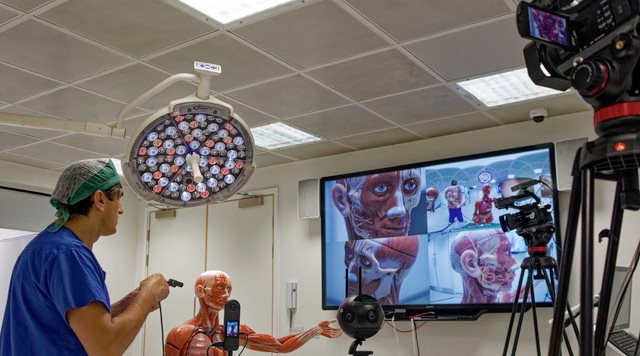Brighton and Sussex Medical School (BSMS) became the first medical school in the UK to extend its provision of anatomy and surgical teaching/training by using live streamed footage of cadaveric donors being dissected in a secure manner this week.
Staff at BSMS, a joint venture between the University of Sussex and the University of Brighton, have implemented a blended medical curriculum to ensure that students still receive face-to-face teaching in key clinical areas, while at the same time benefitting from the latest digital innovations to support their learning.
One of these innovations has been to bring the dissecting room, a highly regulated space, to students via streaming. This has been carefully planned, considering the Human Tissue Authority regulations, and only involves donors who have consented to this activity. Medical students have already had an introduction session, where they have explored the muscles and bones of the chest, and Year 2 students and Medical Neuroscience students have witnessed a brain being removed and have learnt about the nerves and blood supply to the brain in this way. Medical students will still come into the laboratory in small groups and undertake dissection, but this new innovation has ensured the material can still be covered despite restrictions.
Professor Claire Smith, Head of Anatomy at BSMS says: “In responding to the current restrictions, it remains imperative that medical and surgical teaching continues. In anatomy teaching, COVID-related restrictions have been compounded by the medical school only receiving half the number of donated cadavers for teaching. We are so fortunate to have donors and my thoughts are always with those have suffered loss at such a difficult time. This new innovation has meant that the donors’ wish to educate and inform future generations can still occur, albeit in a slightly different way.”
Professor Juliet Wright, Director of Undergraduate Teaching and Learning at BSMS, adds: “We are really pleased to be able to deliver this innovative blended programme to maintain our high standards for teaching in anatomy during these challenging times and are greatly indebted to our donors and families for their support to our course.”
Student feedback from those who attended the brain removal session this week has included “it was an incredible experience to see a human brain in such detail and the cranial cavity” and “it’s definitely a learning curve with all the new tech tools, but I really felt that I gained an incredibly valuable experience by being present during the session. I know that I speak on behalf of all the Medical Neuroscience students when I say that we are very grateful for the opportunity to be included on something like this!”
It is not only medical students who are benefiting from this innovation. In September, a week-long course was arranged by Dr Jag Dhanda, Consultant Maxillofacial/Head and Neck Reconstructive Surgeon at Queen Victoria Hospital NHS Foundation Trust, who used the live stream to demonstrate surgical procedures on cadavers with virtual reality (VR), or 360 cameras. Multiple camera angle perspectives in the virtual reality view was live streamed to 350 surgeons from 26 countries around the world. These surgeons were able to view the surgical techniques on cadavers through virtual reality headsets that allowed them to choose the camera angle perspective they wanted by moving their heads. Specialties involved include maxillofacial/head and neck surgeons, plastic surgeons, ear nose and throat surgeons, orthopaedics, breast, vascular surgeons and hand surgeons, as well as anaesthetists and emergency medicine doctors.

Dr Jag Dhanda demonstrates surgical procedures on cadavers to 350 surgeons around the world in the BSMS anatomy laboratory.
Dr Dhanda said: “We have all had to adapt in how we deliver teaching and training for doctors in the COVID-19 era. Using a readily available technology like VR provides a much more immersive experience for trainees in which they literally feel they are 'in the room’ with the tutor. Using this in the anatomy laboratory at BSMS with cadavers is a unique approach that has enabled us to provide a worldwide first in demonstrating surgical techniques in this manner.”
For enquires related to body donation, please see www.kcl.ac.uk/research/london-anatomy-office
Professor Smith’s book, The Silent Teacher: the gift of Body Donation, is available from all good retailers.